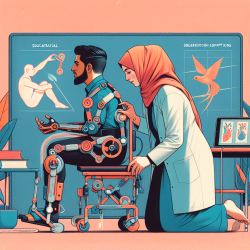As practitioners in the realm of special education and therapy, our continuous goal is to find innovative ways to improve the quality of life and learning experiences for our patients, especially those who are physically disabled. The advancements in technology, particularly microcomputers, have opened up a new world of possibilities for therapeutic interventions. A deep dive into the research article "Current Canadian Clinical Concepts" reveals significant insights into how software and computer peripherals can be effectively utilized to enhance therapy for patients with communication disorders.
Microcomputers are increasingly being recognized for their potential as diagnostic, treatment, and administrative tools within the broad spectrum of communication disorders. The adaptability of these systems to meet the needs of physically disabled users is particularly noteworthy. From keyboard modifications to software adaptations, the article outlines a variety of commercially available products designed to enable users with even the most limited physical capabilities to access and benefit from personal computer systems.
Key Insights and Applications:
- Mechanical Adaptations: Simple modifications such as latch keys can solve accessibility issues for users unable to perform simultaneous key presses. More complex solutions, like electronic substitutes for keyboards, cater to users with more significant physical limitations, allowing them to engage in computer-based tasks and improve their self-image and morale through the ability to produce perfect assignments independently.
- Keyboard Emulating Interfaces: These interfaces offer an alternate means of input for severely physically disabled users, allowing them to control a computer with a single reliable movement. Systems like the Adaptive Firmware Card (AFC) and TETRAscan utilize scanning methods to enable users to make selections, significantly enhancing their ability to interact with various software applications.
- Software Modifications: Programs like MAC APPLE redefine keys to accommodate one-fingered typists, enabling them to use special functions without the need for simultaneous key presses. Input acceleration programs further aid users by allowing the creation of shortcuts for frequently used words and phrases, facilitating faster communication.
- Alternate Keyboards: For users with restricted range of motion or those requiring an expanded keyboard layout, alternate keyboards like the TARGET keyboard or the UNICORN keyboard provide customized solutions that enhance accessibility and interaction.
These technological advancements are not just about facilitating basic tasks; they're about opening up new avenues for education, creativity, and personal expression for physically disabled individuals. By integrating these tools into therapy sessions, practitioners can significantly enhance the therapeutic outcomes for their patients.
Implementing Technology in Therapy:
Adopting these technological solutions requires a thoughtful approach. Practitioners should consider the individual needs and capabilities of each patient to select the most appropriate tools. Training and support are crucial for both therapists and patients to ensure successful implementation. Furthermore, collaboration with technologists and engineers can lead to customized solutions that address specific challenges faced by patients.
Encouraging further research and development in this area is also vital. As technology evolves, so too can the tools and methods we use in therapy. Practitioners should stay informed about the latest advancements and consider how these can be integrated into their practice to benefit their patients.
Conclusion:
The integration of microcomputers and adaptive technology in therapy for physically disabled patients offers a promising pathway to enhancing therapeutic outcomes. By leveraging these tools, we can provide our patients with greater independence, improved communication abilities, and an enhanced quality of life. The insights provided by "Current Canadian Clinical Concepts" serve as a valuable resource for practitioners looking to incorporate technology into their therapeutic approaches. As we continue to explore and implement these technological solutions, the potential for positive impact on our patients' lives is immense.
For those interested in exploring this topic further and gaining a deeper understanding of the practical applications of these technologies, reading the original research paper is highly recommended. To read the original research paper, please follow this link: Current Canadian Clinical Concepts.










